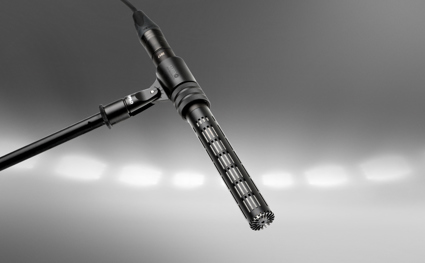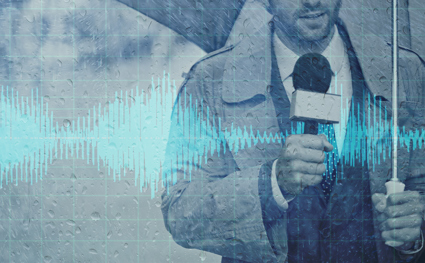7 points about working with sound in the film industry
There are many truths (and some myths) about working on a sound crew in the film industry. It is a challenging environment, so I have gathered some of my thoughts, tips and tricks that I have learned throughout my years in the business. By Antoin Cox, Recording Engineer & DPA Master

Sound is often a low priority
You often hear the sound crew talk about how sound is a low priority on a film set. However, is this true? Yes, it really feels like it, but is sound really thought so little of, or are other departments' budgets also going down? Big question!
The problem is that many people on set should know something about sound – the production and camera crew, directors, etc. The truth is that, usually, only the sound crew understands sound – the other crewmembers don’t really hear the sound. They're all focused on the visual quality on set and they leave the sound, which they don’t understand, to us sound people.
The film crew has to trust the sound engineer. Over the last years, I have worked with many directors. Some like sound; some hate sound. Some think it’s easy; some think it’s difficult. Some understand it; some don’t have a clue.
Personally, I like to work with directors and producers who like sound, need sound, see the advantage of good recorded sound and understand sound. These individuals don’t roll if sound is not ready or if nature is not cooperating. If they do have to roll, they talk to you about it and they apologize, knowing that the sound captured will not be optimal.
At the other end of the spectrum, there are individuals who think they can solve everything in post. They prefer to roll and assume that they can fix it later. Often, in postproduction, they are mad at the sound crew due to the horrible audio recorded.
Sometimes, the postproduction people ask me why some projects I've recorded sound better than others do. I explain that I cannot create great sound on my own. I need the director, the director of photography, production designer and 1st assistant director for real sound quality!
You will need extra ‘non-authorized’ accessories
On a daily basis, my crew and I need to get creative to ensure that we have properly placed our mics to both optimize sound capture and ensure invisibility.

Plant mics: Mounting is always an issue with these types of mics. They need to be placed safely and securely, they need to be in the right place to capture the best sound, they need to be hidden and they have to be aimed correctly. Making sure each of the needs is optimized is very difficult. To make sure I always have what I need, I bring two crates filled with 'grip' materials everywhere I go. I also use many acoustic materials like carpets, drapes, foam, felt, etc.
Radio mics: Miking an actor up takes a lot of skills beyond understanding sound. You need to be socially competent, inventive and quick. Almost everything I use for mounting purposes on set is non-authorized gear – body tape, belts, double- sided tape, straps, paperclips, etc. Remember, a big toolbox with a wide range of material is your friend on set.
Not enough time to place mics
When the cast is ready, they are ready … to shoot. Once they come from costume and make up, we have very little time to get them miked up. Most of the cast and crew always feel that sound takes too much time. There is almost never enough time to test properly before shooting or rehearsal, so we are often running around fixing things in between takes.
In my opinion, it is often better to go the trailers and wire the cast there. Get your fourth sound crew member for wiring, it has many benefits! S/he can stay at the village to wire everybody before they travel to set, so when they arrive on set they are ready.
Before I start a new project, I invest time in getting to know the costume department to make sure we have a good relationship and are ready to collaborate. Always make sure to wire the cast after they are entirely in costume, if possible. This way you know what you are going to get. This saves time on set – no surprises, no adjustments.

Complex costumes are hard to mic
Ideally, I prep a wire in a costume. It takes some prep time but it is worth it. Therefore, my advice is to tell your producer you need time to prep. This way, when you go to rig the mics on the cast, it goes much faster and without as much hassle (for both the sound crew and the cast). Even though sound is your first priority, you must make sure the cast is comfortable – then they don’t start complaining about wires to the other crew.
In conjunction with this, costume noise is a big problem these days. Again, make sure you have a good relationship with the costume department. That way you can make them aware that noise from clothing is a major problem later in the production, but that it can be mitigated. Perhaps they can do their magic designing costumes – in quiet scenes they could choose fabrics that are relatively quiet and leave the noisy stuff for action sequences.
It's difficult to mic living, breathing actors
Some actors are easier to deal with than others are. Exactly how an actor is miked up differs considerably. Sometimes it is done by one of my sound assistants, sometimes it is a costume assistant, sometimes it is the actor's personal assistant. The actor has a lot of say in these things. Sometimes, the actor doesn't want to be touched during the miking process. This can be difficult.
I have found that, especially during the beginning of filming, I mic the actor with up to five people around us, to ensure they are comfortable with the process. In addition, in this way, I can demonstrate the proper way to mic the actor in front of the personal assistant. This is beneficial if, later, the sound crew is not allowed to do the miking anymore and we must rely on the personal assistant's knowledge.
It is also a good idea to clean the mic in front of the actor but it takes time. I usually do it way before miking. Remember, sometimes the wire is drying out after cleaning and it becomes stiff and curly. Do not clean too much!

Breaks happen!
Cables and connectors break – we are working on a live film set. This is often the case when the actors try to take off the mic or turn it off between takes. Once this happens, there is often bad vibes (because it takes time) on the set that need to be remedied as soon as possible.
If a break occurs, always try to fix the problem before you wire the actor up again. Then listen to the sound when you are done (so the actor knows it is working). This minimizes the time you are physically dealing with the cast members and assures them that everything is working again. Make sure to tell them when everything is working so they feel secure.
Price is often an issue
I think pricing is often more of an issue for sound in film than in TV/Live situations. This is because we are often the owners/ buyers of our gear and we rent it out to production. In this case, it is my own call what I buy.
My rental fee stays almost the same if I buy all DPA microphones as opposed to a competing brand. For film production, it is about quantity then quality. There has never been a time when a producer has asked me what gear I use. They don't know and they don't care. They care about how many tracks I can record, how many switches I have on my mixer board. They like to move faders and know how many wireless transmitters I have in the pack. Most important to them is if you can work fast and act low profile, but of course, you need to work with the best kit available. They don’t know the brands or the real needs.
The same is never true for editors, postproduction sound crew, dialog editors, re-recording mixers – they are all interested in what you use. In my experience, if you mention DPA they are very happy. They also appreciate other high-quality mics, but they never approve of the cheaper brands because they don’t like the sound that goes to their mixers!
The post people talk a lot with the producers and directors about the sound and the quality I recorded on previous movies. They give real feedback about the production tracks to the people who are hiring. So good gear is super important!
About Antoin Cox
In 1999, Antoin graduated with a degree in Sound Design and Production Sound Recording and he started on his first feature film. Since 2004, Antoin has focused on production sound recording on feature films, with international film projects in Europe, the USA, and many other places and circumstances. He is also a member of the Cinema Audio Society.



